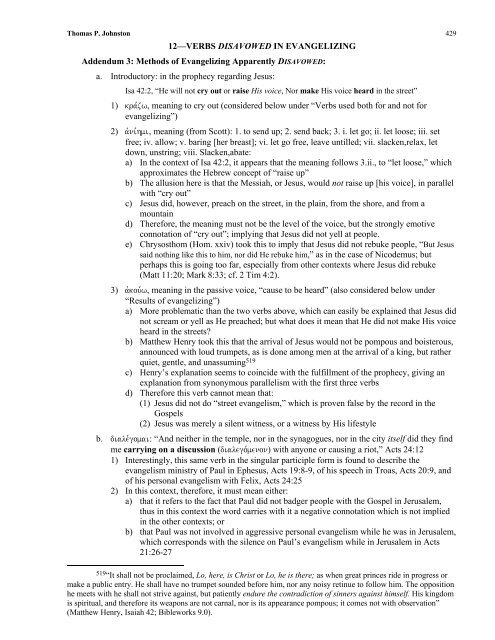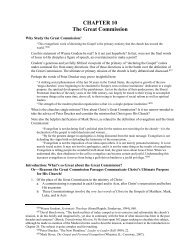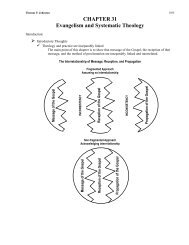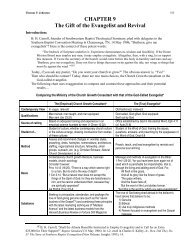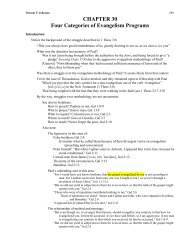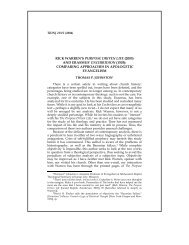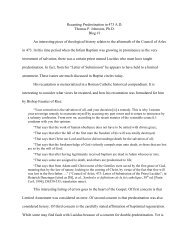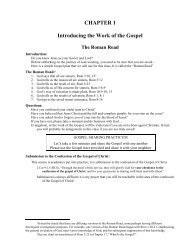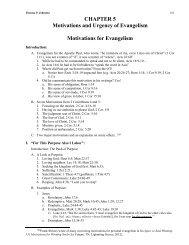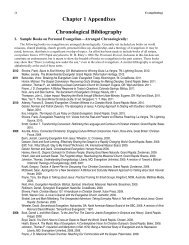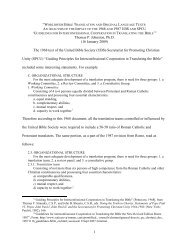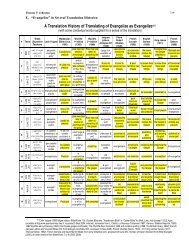CHAPTER 7 Defining Evangelizing - Evangelism Unlimited
CHAPTER 7 Defining Evangelizing - Evangelism Unlimited
CHAPTER 7 Defining Evangelizing - Evangelism Unlimited
You also want an ePaper? Increase the reach of your titles
YUMPU automatically turns print PDFs into web optimized ePapers that Google loves.
Thomas P. Johnston 429<br />
12—VERBS DISAVOWED IN EVANGELIZING<br />
Addendum 3: Methods of <strong>Evangelizing</strong> Apparently DISAVOWED:<br />
a. Introductory: in the prophecy regarding Jesus:<br />
Isa 42:2, “He will not cry out or raise His voice, Nor make His voice heard in the street”<br />
1) kra,zw, meaning to cry out (considered below under “Verbs used both for and not for<br />
evangelizing”)<br />
2) avni,hmi, meaning (from Scott): 1. to send up; 2. send back; 3. i. let go; ii. let loose; iii. set<br />
free; iv. allow; v. baring [her breast]; vi. let go free, leave untilled; vii. slacken,relax, let<br />
down, unstring; viii. Slacken,abate:<br />
a) In the context of Isa 42:2, it appears that the meaning follows 3.ii., to “let loose,” which<br />
approximates the Hebrew concept of “raise up”<br />
b) The allusion here is that the Messiah, or Jesus, would not raise up [his voice], in parallel<br />
with “cry out”<br />
c) Jesus did, however, preach on the street, in the plain, from the shore, and from a<br />
mountain<br />
d) Therefore, the meaning must not be the level of the voice, but the strongly emotive<br />
connotation of “cry out”; implying that Jesus did not yell at people.<br />
e) Chrysosthom (Hom. xxiv) took this to imply that Jesus did not rebuke people, “But Jesus<br />
said nothing like this to him, nor did He rebuke him,” as in the case of Nicodemus; but<br />
perhaps this is going too far, especially from other contexts where Jesus did rebuke<br />
(Matt 11:20; Mark 8:33; cf. 2 Tim 4:2).<br />
3) avkou,w, meaning in the passive voice, “cause to be heard” (also considered below under<br />
“Results of evangelizing”)<br />
a) More problematic than the two verbs above, which can easily be explained that Jesus did<br />
not scream or yell as He preached; but what does it mean that He did not make His voice<br />
heard in the streets?<br />
b) Matthew Henry took this that the arrival of Jesus would not be pompous and boisterous,<br />
announced with loud trumpets, as is done among men at the arrival of a king, but rather<br />
quiet, gentle, and unassuming519 c) Henry’s explanation seems to coincide with the fulfillment of the prophecy, giving an<br />
explanation from synonymous parallelism with the first three verbs<br />
d) Therefore this verb cannot mean that:<br />
(1) Jesus did not do “street evangelism,” which is proven false by the record in the<br />
Gospels<br />
(2) Jesus was merely a silent witness, or a witness by His lifestyle<br />
b. diale,gomai: “And neither in the temple, nor in the synagogues, nor in the city itself did they find<br />
me carrying on a discussion (dialego,menon) with anyone or causing a riot,” Acts 24:12<br />
1) Interestingly, this same verb in the singular participle form is found to describe the<br />
evangelism ministry of Paul in Ephesus, Acts 19:8-9, of his speech in Troas, Acts 20:9, and<br />
of his personal evangelism with Felix, Acts 24:25<br />
2) In this context, therefore, it must mean either:<br />
a) that it refers to the fact that Paul did not badger people with the Gospel in Jerusalem,<br />
thus in this context the word carries with it a negative connotation which is not implied<br />
in the other contexts; or<br />
b) that Paul was not involved in aggressive personal evangelism while he was in Jerusalem,<br />
which corresponds with the silence on Paul’s evangelism while in Jerusalem in Acts<br />
21:26-27<br />
519 “It shall not be proclaimed, Lo, here, is Christ or Lo, he is there; as when great princes ride in progress or<br />
make a public entry. He shall have no trumpet sounded before him, nor any noisy retinue to follow him. The opposition<br />
he meets with he shall not strive against, but patiently endure the contradiction of sinners against himself. His kingdom<br />
is spiritual, and therefore its weapons are not carnal, nor is its appearance pompous; it comes not with observation”<br />
(Matthew Henry, Isaiah 42; Bibleworks 9.0).


